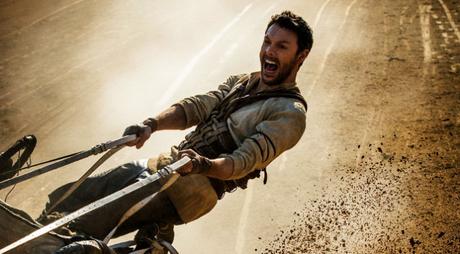
Review: In case you never heard, there were a lot of adaptations before Timur Bekmambetov's version. Most notable version of it is William Wyler's 1959 classic, noted for the massive 4-hour duration with a climactic chariot race, which took 5-week and hundreds of extras to complete. Regarded as one of the greatest films ever made - winning 11 Oscars, (1959) indeed sets a high standard for any future version.
Timur's might not be as grand as William Wyler's (or original novel, which inspire those adaptations). This version takes a creative liberty to deconstruct elements from both original source and the succesful film; only to reconstruct them into a lighter, colossal pop-corn flick, which serves nothing but mere entertainment.
alters some background stories to make it independently enticing; while at some parts it works, but not entirely. Judah Ben-Hur (Jack Huston) is still a Jewish prince and a half-brother of Messala (Toby Kebbell), a Roman-born. While it's quite intriguing how they device such plot point to make the film feels more personal; the brotherhood between the two cannot really live up the expectation (meanwhile, in 1959 version, both main characters have never been more than close friends).
Things escalate when Messala decides to go to Rome, serving as a tribune; meanwhile, Judah stays as a merchant and crosses path with Jesus Christ (Rodrigo Santoro). Timur's version gets a more modern issue to spark the conflict, instead of igniting a more sensitive religion insults; it roots on rebellion purpose as the Zealots are waging war against Roman Empire for building a new arena upon Zealot's sacred ancestral burial site.
When a Bible cameo, Pontius Pilate (Pilou Asbæk), governor of Judea pays a visit to Jerusalem; a Zealot harbored by Judah attempts to assasinate the governor, putting Judah and his family's fate at stake. A dilemmatic Messala decides to convict Judah and family; as he sends his family into crucifixion and Judah to exile as a galley rower. From there, a dream of revenge has been set dead ahead by devastated Judah, and his encounter with an Arab sheikh, Ilderim (Morgan Freeman) is the ticket to that.
Clocked in at approximately half of its classic counterpart's duration, suffers mainly from oversimplifying. While some plot points are proven to be more effective and profound than the classic; Timur's version cannot cope up with its prominent setup into making a more engaging story. Some important elements from Judah's harrowing, faith-ridden journey isn't included into Timur's story. Besides, Keith R. Clarke and John Ridley's script often takes shortcuts in narrating one of the most intriguing epic into a pop-corn delight.
One important point: Judah and Messala's bromance turned into bad romance isn't really captured into an emotional-driven drama. One crucial reason is Jack Huston's bland depth to the titular hero; there's been lack of sympathy emanates from Ben-Hur's persona, making audiences at some moments feel more sympathetic to Messala. Yet, it isn't necessarily Huston's fault; it's the script that makes his character less charismatic than he should be, although, often Judah Ben-Hur is depicted as a more prophet.
In terms of production, this feels like an inert manifestation of the story. It somehow fails to embrace the grandiosity of the story by crafting a minor-production compared to megaproduction of the 1959 classics. The chariot race, which is supposed to be the climax, is crafted well - but not special. CGI-laden arena and action plus lacks of innovation drowns his climactic scene as the nadir, while it remains the best scene in this version of . It's not that it is bland - it is entertaining; the problem is: it shows how inert the filmmakers to embrace the grandiose and oversimplifies it for the sake of I-do-not-know, maybe, cutting corners or effectiveness.
One more point about is the Biblical reference as stated in the original source's title: Ben-Hur: A Tale of Christ. Not only the story of Judah Ben-Hur juxtapose with the timeline of Jesus according to the Bible, Christ also makes cameo in both original novel and every adaptations of it. Timur's version might spend more time for Jesus than the 1959's version; even, it follows the storyline in the novel where Jesus is an integral part, as a symbol of political rebellion. Timur cannot give urgency to the presence of Jesus in the story; and even, every presence presents no real charisma (only some hints about who Jesus is - a carpenter? seriously? and some preaches). Therefore, it is difficult to make connection between Ben-Hur's story and Jesus' story in one timeline - while it's the most important element of the story.
While it works on some levels as mere entertainment, Timur Bekmambetov's suffers from lack of grandiosity and, at some points, star-power. It is an epic that has become a classic cult for decades (even, a century); while what the remake does is simply an inert, lazy reimagining of the story with B-movie treatments. Judah Ben-Hur and Messala are both big figures portrayed by actors who haven't reached such star-meter to depict such characters with charisma. Relying much on CGI to cover up the classics' megaproduction is also a downfall to the legacy.
Oversimplifying everything to make it 'effectively' entertaining might not be an excuse for a story this grand. After all, the sliver lining is: at least, people now know about the classic people are comparing to.
Ben-Hur (2016)


Action, Adventure, Drama, Adaptation, Remake Directed by: Timur Bekmambetov Written by: Keith R. Clarke, John Ridley based on novel by Lew Wallace Starred by: Jack Huston, Toby Kebbell , Rodrigo Santoro, Morgan Freeman Runtime: 125 mins Rated PG-13
This review is sponsored by Book My Show Indonesia.
